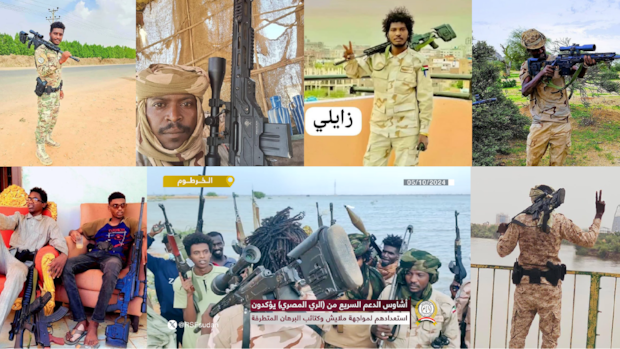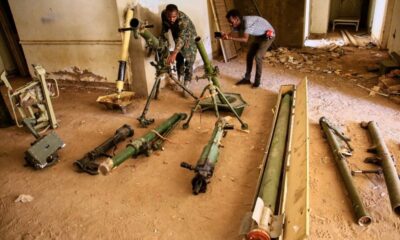Politics
Canadian-Made Rifles Found in Sudan’s Civil War After Massacres

Weapons produced by a Canadian arms manufacturer have been identified in the hands of a paramilitary group in Sudan, which is implicated in civilian massacres. Analysis conducted by CBC’s visual investigations unit has revealed that rifles bearing the logo of Sterling Cross Defense Systems were used by the Rapid Support Forces (RSF) in ongoing violence that erupted on April 15, 2023.
The conflict in Sudan has led to catastrophic humanitarian consequences, with an estimated 150,000 fatalities and over 12 million civilians displaced internally. The city of El Fasher, considered a crucial stronghold for the Sudanese Armed Forces (SAF), has become a focal point in this devastating civil war. Following a prolonged siege, the RSF gained control of El Fasher on October 26, 2024, which was subsequently followed by reports of horrific civilian massacres.
Evidence of Canadian Weapons in Conflict
The CBC investigation confirmed that RSF fighters have been photographed with Sterling Cross’s XLCR sniper rifles, with evidence dating back to at least 2023. Multiple images and videos, verified through geolocation and emblem matching techniques, depict RSF members wielding these rifles, which display the Sterling Cross logo prominently on their lower receivers.
On October 5, 2024, the RSF shared a video on its official Telegram channel showcasing fighters along the southern front of Khartoum. In this footage, one fighter was seen carrying a modern bolt-action precision rifle, identifiable by its distinctive features and the visible Sterling Cross logo.
The presence of these Canadian-made rifles in Sudan is not an isolated incident. CBC has verified at least nine separate instances where RSF fighters were seen with Sterling Cross firearms. An undated image on social media further illustrates an RSF fighter holding the same rifle, reaffirming the link between Canadian arms and the ongoing violence.
When approached for comment, Aimee Byrne, director of operations at Sterling Cross, did not address specific inquiries about the company’s involvement in arms sales to regions associated with factions in Sudan. She emphasized that the company adheres to the policies set by Global Affairs Canada and is compliant with the Export and Import Permits Act. Global Affairs Canada did not respond to requests for comment by the time of publication.
Impact of Foreign Arms on Sudanese Conflict
Experts suggest that the influx of foreign weapons, including those from Canada, has intensified the conflict in Sudan. Kholood Khair, director of Confluence Advisory, highlighted the role of various countries in supplying arms to the RSF, including the United Arab Emirates. “We have seen reports of American, British, and Canadian spare parts or full weapons making their way into RSF hands through the U.A.E.,” she stated.
Despite Canada maintaining an arms embargo on Sudan since 2004, the loopholes in monitoring and documenting exports have raised concerns. Emadeddin Badi, a senior fellow at the Global Initiative Against Transnational Organized Crime, noted that the U.A.E. has been a significant conduit for Canadian arms, as it lacks a robust domestic defense industry.
The Canadian government has previously engaged in arms exports to the U.A.E., which has been accused of supplying weapons to the RSF. Badi remarked, “Canada exports millions of dollars’ worth of weapons and systems to the U.A.E., which supplies the RSF.” This raises crucial questions about the effectiveness of Canada’s arms export regulations.
The complexity of the situation is exacerbated by the lack of detailed public trade data. Mike Kanko, CEO of ImportGenius, pointed out that Canada does not release granular trade information, making it difficult to track the flow of arms once they leave the country. “Public awareness of corporate activity is essential in an informed society,” he stated.
Calls for increased accountability are growing. Nicholas Coughlin, a former envoy in South Sudan, suggested that Canadian law offers mechanisms to address these concerns, potentially involving placing the U.A.E. on the Country Control List or imposing re-export conditions.
As the humanitarian crisis in Sudan escalates, the international community is urged to reassess the implications of arms exports and the responsibility of manufacturers. The ongoing violence, marked by civilian suffering and large-scale displacement, underscores the dire need for accountability and transparency in the arms trade.
-

 World4 months ago
World4 months agoScientists Unearth Ancient Antarctic Ice to Unlock Climate Secrets
-

 Entertainment4 months ago
Entertainment4 months agoTrump and McCormick to Announce $70 Billion Energy Investments
-

 Lifestyle4 months ago
Lifestyle4 months agoTransLink Launches Food Truck Program to Boost Revenue in Vancouver
-

 Science4 months ago
Science4 months agoFour Astronauts Return to Earth After International Space Station Mission
-

 Technology2 months ago
Technology2 months agoApple Notes Enhances Functionality with Markdown Support in macOS 26
-

 Politics15 hours ago
Politics15 hours agoSecwepemc First Nation Seeks Aboriginal Title Over Kamloops Area
-

 Top Stories4 weeks ago
Top Stories4 weeks agoUrgent Update: Fatal Crash on Highway 99 Claims Life of Pitt Meadows Man
-

 Sports4 months ago
Sports4 months agoSearch Underway for Missing Hunter Amid Hokkaido Bear Emergency
-

 Politics3 months ago
Politics3 months agoUkrainian Tennis Star Elina Svitolina Faces Death Threats Online
-

 Politics4 months ago
Politics4 months agoCarney Engages First Nations Leaders at Development Law Summit
-

 Technology4 months ago
Technology4 months agoFrosthaven Launches Early Access on July 31, 2025
-

 Top Stories2 weeks ago
Top Stories2 weeks agoFamily Remembers Beverley Rowbotham 25 Years After Murder




















